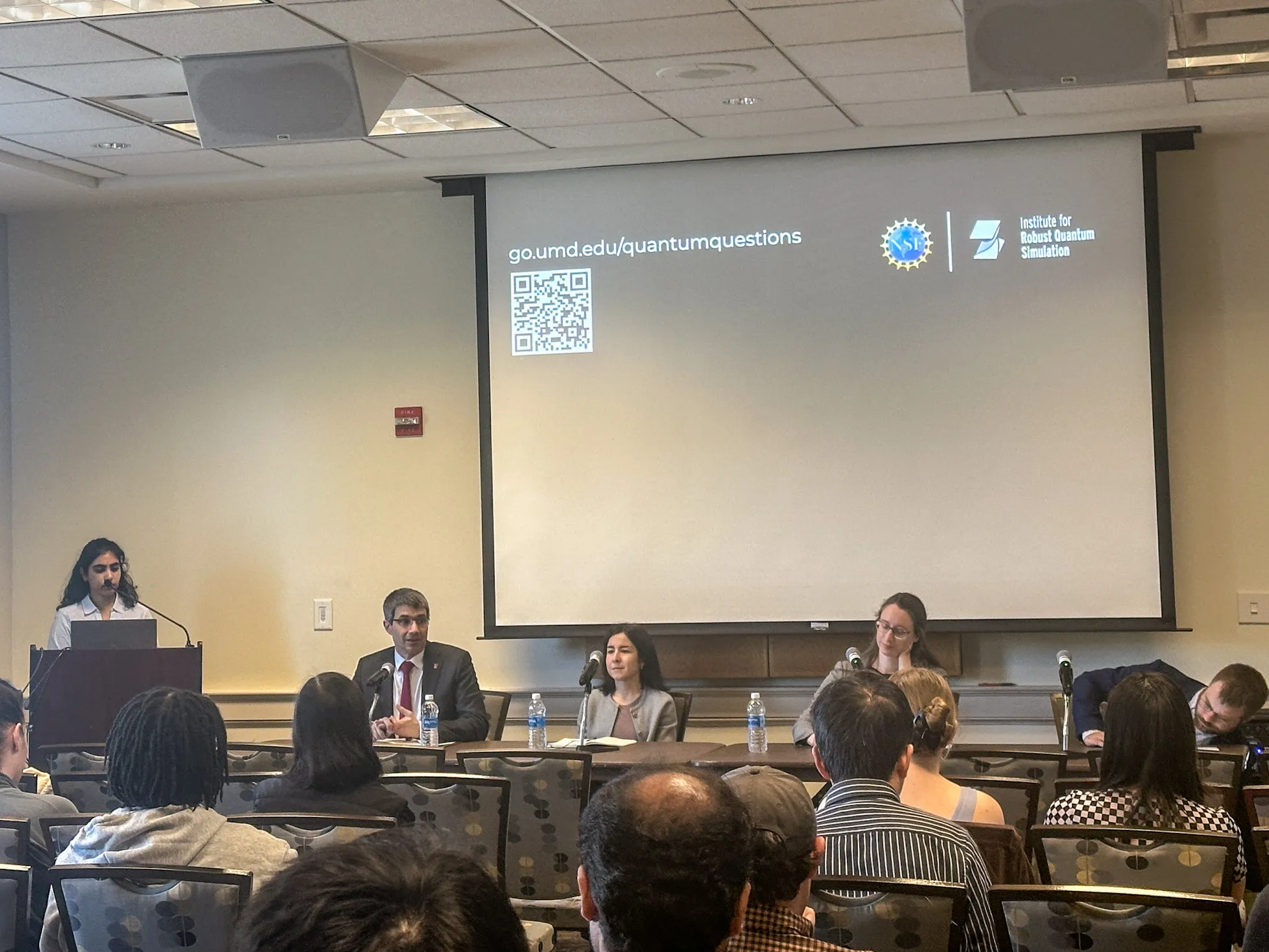
The NSF Quantum Leap Challenge Institute for Robust Quantum Simulation (RQS) recently hosted a series of talks and a lively panel discussion that focused on career pathways involving quantum policy.
The April 17 event at the University of Maryland—tied to that week’s global celebration of World Quantum Day—featured four representatives from across the quantum policy landscape. The distinguished group of panelists introduced students, postdocs and early career scientists to various organizations, programs and potential career pathways in policy matters tied to quantum computing and quantum information science.
Participation in the panel discussion came from Constanza M. Vidal Bustamante, a fellow with the Technology and National Security Program at the Center for a New American Security (CNAS); Zachary Goff-Eldredge, a program manager for quantum information science at the Department of Energy (DOE) Office of High Energy Physics; Emily Grumbling, a research staff member at the Institute for Defense Analyses Science and Technology Policy Institute(STPI); and Jake Taylor, a physicist at the National Institute of Standards and Technology (NIST) with an adjunct appointment in the University of Maryland Institute for Advanced Computer Studies (UMIACS).
Greeshma Oruganti, a Ph.D. student in chemical physics and Twesh Upadhyaya, a physics doctoral student, both members of the RQS student-postdoc council, moderated the discussion.
The event was part of RQS’ career connections series, which offers monthly professional development and networking meetups for students and postdocs active in quantum research on a rolling basis at each of the RQS universities. Organizers say the April event was one of the most successful yet, with more than 70 people attending both in person and online.
The panel discussion emphasized the increasing significance of topics at the intersection of quantum science in public policy. In the past few years, Bustamante said, quantum science has become a key focus of government policy to protect U.S. economic and national security. At CNAS, she investigates quantum technologies’ role in strengthening national security and advancing U.S. quantum innovation.
Similarly, Taylor cited how the National Quantum Initiative—a major milestone he helped spearhead while serving for two years as assistant director for quantum information science at the White House Office of Science and Technology Policy—aims to promote the acceleration of quantum research and development across the country.
NIST, where Taylor currently works, has been a leading driver of research and innovation involving quantum information science, and is closely partnered with the University of Maryland through the Joint Quantum Institute and the Joint Center for Quantum Information and Computer Science, where Taylor is a Fellow and was a founding co-director.
Grumbling stated that after having worked for more than 13 years in science and tech policy, it has given her a comprehensive understanding of government agencies’ policy priorities. At STPI, she’s noticed policymakers’ growing interest in research that helps them make decisions about quantum science and technology.
Goff-Eldredge said that his work at the DOE is centered on the practical applications of quantum research to solve real-world challenges.
“The government wants to figure out what to do with the technology—how to use it to solve problems that are practically useful,” he explained.
As an example, he said that the Department of Defense is exploring how quantum sensors can provide an alternative to GPS systems. Taylor echoed the sentiment of quantum research focused on practical applications, noting that many policymakers want to use quantum technology to create jobs and drive economic growth.
When asked what skills students should develop to break into the policy field, particularly as it relates to quantum science and technology, Goff-Eldredge emphasized the importance of communication skills.
“Learning to talk about your research with someone who doesn’t know anything about your field is key,” he advised.
Meanwhile, Grumbling noted that teamwork was a new skill she had to learn when transitioning from academia to policy.
“At school, I was locked up in a dark room surrounded by lab equipment, so working with others wasn’t something my research experience had prepared me for,” she said.
For Bustamante, policy work meant holding space for a lot of frustration.
“In Congress, there are entrenched political notions about how things get done,” she said. “Understanding political dynamics and framing your evidence to account for the perspectives of various stakeholders is key.”
Wrapping up the discussion, Taylor urged audience members to be enthusiastic about their research and to be willing to back it in policy spheres. Bustamante also ended on an encouraging note, reassuring students that career paths are often non-linear, and that uncertainty can lead to valuable opportunities.
—Story by Aleena Haroon, UMIACS communications group